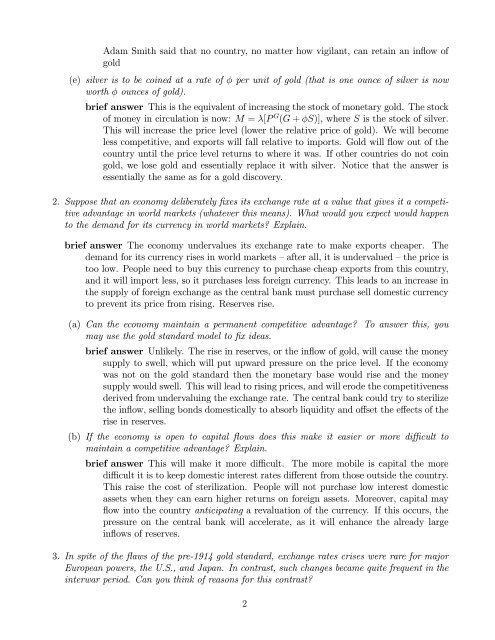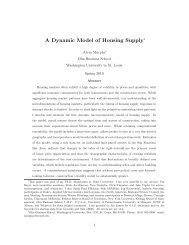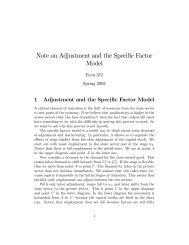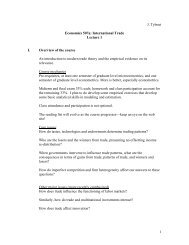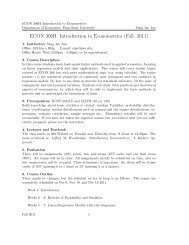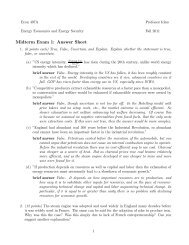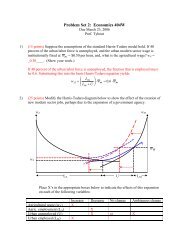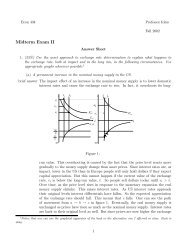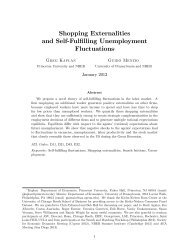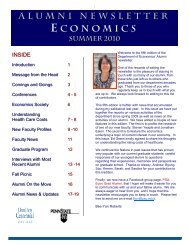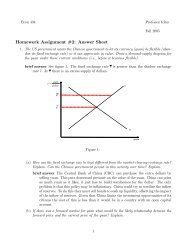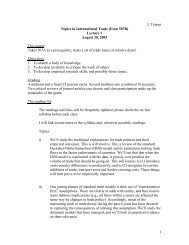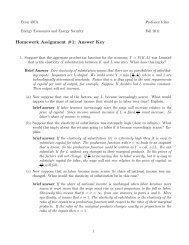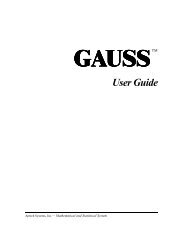Homework Assignment #3: Answer Sheet
Homework Assignment #3: Answer Sheet
Homework Assignment #3: Answer Sheet
- No tags were found...
You also want an ePaper? Increase the reach of your titles
YUMPU automatically turns print PDFs into web optimized ePapers that Google loves.
Adam Smith said that no country, no matter how vigilant, can retain an inflow of<br />
gold<br />
(e) silver is to be coined at a rate of φ per unit of gold (that is one ounce of silver is now<br />
worth φ ounces of gold).<br />
brief answer This is the equivalent of increasing the stock of monetary gold. The stock<br />
of money in circulation is now: M = λ[P G (G + φS)], where S is the stock of silver.<br />
This will increase the price level (lower the relative price of gold). We will become<br />
less competitive, and exports will fall relative to imports. Gold will flow out of the<br />
country until the price level returns to where it was. If other countries do not coin<br />
gold, we lose gold and essentially replace it with silver. Notice that the answer is<br />
essentially the same as for a gold discovery.<br />
2. Suppose that an economy deliberately fixes its exchange rate at a value that gives it a competitive<br />
advantage in world markets (whatever this means). What would you expect would happen<br />
to the demand for its currency in world markets Explain.<br />
brief answer The economy undervalues its exchange rate to make exports cheaper. The<br />
demand for its currency rises in world markets — after all, it is undervalued — the price is<br />
too low. People need to buy this currency to purchase cheap exports from this country,<br />
and it will import less, so it purchases less foreign currency. This leads to an increase in<br />
the supply of foreign exchange as the central bank must purchase sell domestic currency<br />
to prevent its price from rising. Reserves rise.<br />
(a) Can the economy maintain a permanent competitive advantage To answer this, you<br />
may use the gold standard model to fix ideas.<br />
brief answer Unlikely. The rise in reserves, or the inflow of gold, will cause the money<br />
supply to swell, which will put upward pressure on the price level. If the economy<br />
was not on the gold standard then the monetary base would rise and the money<br />
supply would swell. This will lead to rising prices, and will erode the competitiveness<br />
derived from undervaluing the exchange rate. The central bank could try to sterilize<br />
the inflow, selling bonds domestically to absorb liquidity and offset the effects of the<br />
rise in reserves.<br />
(b) If the economy is open to capital flows does this make it easier or more difficult to<br />
maintain a competitive advantage Explain.<br />
brief answer This will make it more difficult. The more mobile is capital the more<br />
difficult it is to keep domestic interest rates different from those outside the country.<br />
This raise the cost of sterilization. People will not purchase low interest domestic<br />
assets when they can earn higher returns on foreign assets. Moreover, capital may<br />
flow into the country anticipating a revaluation of the currency. If this occurs, the<br />
pressure on the central bank will accelerate, as it will enhance the already large<br />
inflows of reserves.<br />
3. In spite of the flaws of the pre-1914 gold standard, exchange rates crises were rare for major<br />
European powers, the U.S., and Japan. In contrast, such changes became quite frequent in the<br />
interwar period. Can you think of reasons for this contrast<br />
2


